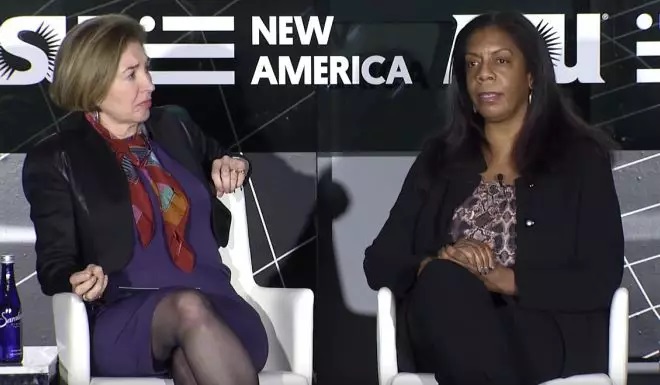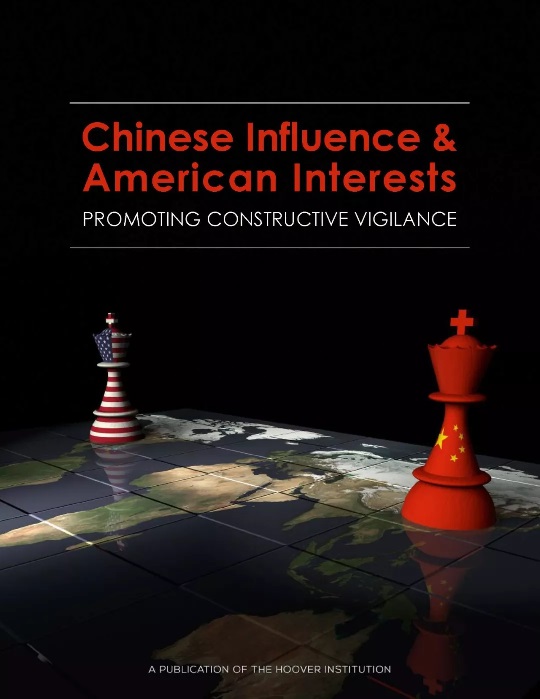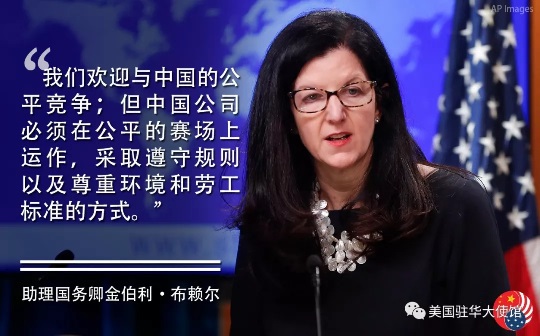
左边是胡佛研究所的成员、美国智库「新美国(New America)」的总裁、美国外交政策与国际事物专家Anne-Marie Slaughter,右边是特朗普内阁国务院政策制定总监Kiron Skinner。在日前举办的一场外交政策研讨会上,右边这位侃侃而谈中国威胁论,甚至对中国使用「非白人」的字眼、并和「文明的冲突」相提并论,而对俄罗斯则视为「大家庭」,这些谈话引起各方的抨击。为了厘清事实,我们找到了这段访谈,进行了文字转录和翻译以查看上下文、进行较完整的理解。

这种把文化、族裔、国家、意识形态全都混为一锅粥的做法,符合保守主义非敌即友二分法思维的套路,也让人们更加警惕「黄祸」、「排华」沉疴泛起的危险。保守主义学者亨廷顿的「文明冲突论」以西方先进、东方落后的二元论解释人类当今的发展和未来的走向,把人类相通的一些价值看成是西方、换言之白人社会的文化基因,而东方则是愚昧的代名词。
与其说这种保守主义是「西方价值」捍卫者,不如说是部落主义和种族主义的大本营。这是违背多元化然而无差别人性的。不难理解,一些不假思索地拥抱这种「保守主义」的华人,也拥抱了东西方文明对立冲突的说辞,甚至在精神上把自己细分出来作为先进。然而以文明冲突为包装的种族主义,面对华人整体,恐怕并不会做这样的细分。
在特朗普政府执政期间,从副总统彭斯(Mike Pence)到FBI局长克里斯托弗·雷(Christopher Wray)的官员都呼吁对中国采取更强硬的态度,国务卿蓬佩奧(Mike Pompeo)也表示中国对美国的「“持续民主」构成了风险,对于中美之间在学术交流、企业研发方面的疑云氛围也导致人心忡忡。胡佛研究所去年发布的《中国影响和美国利益》研究报告,把围堵、防范中国看作对于美国利益攸关的事。在这种氛围下,华裔、华夏文化、中国、黄种人以及对立意识形态等都可能被在公众意识里相互绑定,对我们并不是好的征兆。
KS:I think [a principle] it's important and a lot of the work is being done at the think tanks in Washington including your own which is doing I think some of the most interesting and innovative work on the future of our role in the world and then has to do with new regional partnerships. So I was at Harvard about a week ago they let me back in and and and so we talked about this issue of multilateralism and partnerships and some were trying to say that we're abandoning multilateralism and I said give me the evidence. We did pull out of the Paris climate accord. We did pull out of JCPOA. Then someone said and you pulled out of IMF and I said No the Russians pulled out of IMF five years ago.
我认为【有一个原则】很重要,而且华盛顿的智库正在做很多这方面的工作,包括你自己在做的事情,我认为这些是关于我们未来在世界上所扮演的角色的、最有意思和最具创新性的工作,与新的区域伙伴关系有关。大约一周前,哈佛大学请我回去,我们谈到了这个多边主义和伙伴关系的问题,有些人试图说我们正在放弃多边主义,我说你给我证据。我们确实退出了巴黎气候协议,我们确实退出了JCPOA(伊朗核问题全面协议)。然后有人说,你退出了IMF(国际货币基金组织),我说没有,俄罗斯五年前就退出了IMF。
KS:This is a bipartisan issue. Most of the multilateral fora, most of the international agreements were still there. They're getting stronger. I think NATO -- you know there was NATO week here in Washington recently -- the foreign ministers emerged more united, there were stronger conversations about our mutual commitments and our mutual threats, which are pretty severe. So I think when you look at the issue of partnerships we probably aren't creating another NATO very soon. That's the world's mostdurable security alliance.
这是一个两党合作的问题。大多数国际协议、大多数多边论坛,仍然存在,并且变得越来越强大。我想说北约——你知道最近在华盛顿举行的北约周吧——北约的外交部长们变得更加团结,他们更多地在谈到对我们的共同的承诺和共同面临的威胁。所以我认为,当你考虑合作伙伴关系的问题时,我们很可能不会很快创建另一个北约。它是世界上最持久的安全联盟。
KS:But there will be ways I think that we come together in regional partnerships for particular crises perhaps with the Baltic states and Poland to deal with the eastern flank threat. The northern European countries and Britain have talked about partnering with us for others. And in the end of Pacific you know we have a strategy there that was enunciated early on in the Trump administration to bring nations together to counter China, but there's a lot more…
但是我认为,我们可以通过波罗的海国家和波兰的区域伙伴关系,来解决特定危机。北欧国家和英国也和我们谈到在其他议题上的合作。在太平洋这一边,我们在特朗普政府的早期就已经制定了一项战略,将各国团结起来遏制中国,还有其他。
AMS:This sounds a lot like Coalitions of the Willing.
我认为这听起来很像有志者联盟(美国领导下的多国部队行动)。
KS:It is, and I think you've written about this, but I think that that's in some ways going to be more prominent going forward given the multiplicity of threats. This is a very different century.
是的,而且我认为你已经就这个问题写过文章。我认为鉴于威胁的多样性,如今在某种程度上会更加突出。这是一个非常不同的世纪。
AMS:So I can summarize the Trump doctrine:you know. the United States is a sovereign nation guided by its national interests that expects "I will do for you if you do for us", and if we share the burden, which is a realist view of the world. It may not be hostile to multilateralism but it certainly puts the nation's first and does not accept many constraints on sovereignty. I was intrigued. I just have to ask what's the Pompeo corollary, is there a particular difference there?
我可以总结特朗普的理念:美国是一个以其国家利益为指导的主权国家,期望“如果你为我们做什么,我才会为你做什么”,我们分担负担,这是对世界的现实主义看法。它可能不会对多边主义产生敌意,但它肯定会倡导国家优先,并且不会接受对主权的诸多限制。我很好奇。我只想问一下国务卿蓬佩奧的方针是什么,有什么特别不同的吗?
KS:Yes in fact Pompeo asked me that very question ... what I think is going on at the State Department under him is that he's attempting to really define in the broad Trump doctrine which addresses economic and defense and a broad range of policy challenges. But what I think Pompeo doctrine is, is trying to find the diplomatic angle in all aspects of what the president's attempting to do:in security, society, the economy, energy. and the international system.
事实上蓬佩奧也这么问我,我认为他所在国务院正在进行的是,他试图切实地定义特朗普宽泛的经济和防务理念,以及广泛的政策挑战。但我对于蓬佩奧理念的理解是,在总统试图做的各个方面寻找外交的视角,包括安全、社会、经济、能源和国际体系等。
……
AMS:So I want to ask you about how you engage in diplomacy in a world in which -- we've talked about this a lot today -- the President's essentially said in the national security strategy we see a return to great power competition. So China now and Russia and any others countries, you might name, are seen as great powers to whom we are adverse at least much of the time. How does that affect the way the State Department, the entire European department which addresses all of Europe and Russia, and of course East Asian Affairs focused on China. How does that affect the diplomacy to now see them as rival great powers.
所以我想问你如何在当今世界中参与外交,我们今天就这个问题谈过不少,总统在国家安全战略中基本上是说,我们看到的是重返大国竞争。中国和俄罗斯,以及其他你可以列举的国家,被视为对我们不利的大国,至少在很大程度上。这会如何影响国务院的运作?涉及整个欧洲和俄罗斯,当然该有以中国问题为焦点的东亚事务。如今把他们看作竞争大国,对外交现在如何影响?
KS:The National Security Strategy was an important document early on in the Trump administration for all the noise that people talked about at the White House and the fact that we were quickly onto our second national security adviser and new deputies. We in record time got a powerful statement in the National Security Strategy of December 2017 and it talked about a return to great power competition and that was a general H.R. McMasters. I think, big insight. I think we've evolved since then that we do have Russia and China as great power competitors. They've been that for a long time, a lot of this is are cognition of the reality that's been on the ground. But I think we're differentiating those challenges. Russia is more of a kind of a global survivor, I think, in its great power status. But China we see it as a more fundamental long term threat. That's not a partisan issue. And one of the ways in which Donald Trump has contributed to a bipartisan foreign policy consensus is on China because at the start of his presidency there wasn't the kind of understanding that China is the long term threat. It is a real problem.
在特朗普政府早期,虽然白宫里七嘴八舌,但是国家安全战略是当时的一份重要文件,而且我们很快就找到了第二个国家安全顾问和新的代表。早在2017年12月,我们就在创纪录的时间内就国家安全战略发表了一份有力的声明,并透过麦克马斯特谈到重返大国竞争的问题,我认为很有见地。从那时起我们又有所发展。我们确实有俄罗斯和中国作为强大的竞争对手,他们这样的地位已经有很长一段时间,我们在很多程度上是认识到现实。但我认为我们正在区分这些挑战。俄罗斯更像是在全球范围内以求生为主,以保持它的强大为主。但至于中国,我们认为是一个更为根本的长期威胁。我认为这不是一个党派议题。唐纳德·特朗普为两党外交政策共识做出贡献的方式之一就是中国,因为在他担任总统之初,人们并不认为中国是长期的威胁。这真正是个问题。
AMS:So when you say "threat" I would probably say "adversary", I'm not saying "threat".
你说“威胁”,我可能会说是“对手”而不会说是“威胁”。
KS:I think the vocabulary is still evolving and I would I agree with you that it is an adversary. It's in this way and it's a long term fight with China, or a long term competition, and it has I think historical, ideological and cultural as well as strategic factors that a lot of Americans do not understand even in the foreign policy community and to map our chart, our understanding of the world onto theirs, I think it's a huge mistake. And what we are working on at the State Department is a comprehensive China policy now and a lot of that is being led on the seventh floor at State but in close concert with all of the bureaus who are thinking about this regional and functional at the core of their work now.
我们的用词在变化,我同意你的说法,是“对手”。这是与中国的长期斗争或说竞争,我认为在历史上、意识形态上、文化上,以及在战略因素方面,很多美国人都不了解,甚至在外交政策社区,把我们对世界的理解用来跟他们相提并论,我认为这是一个巨大的错误。我们在国务院正在制定的,是一项全面的中国政策,其中很多都是在国务院七楼的领导下,但与所有正在思考这一领域和功能核心的所有部门密切合作。
AMS:Is a strategic and economic dialogue still going with China? So Tim Geithner started this, there had been the strategic economic dialogue led by Treasury. Actually that was under George W. Bush and then when Secretary Clinton came in it became the Strategic and Economic Dialogue meaning the State Department led it not Treasury. But I don't know.
那么与中国保持战略和经济的对话还在继续吗?高逸然(Tim Geithner)领导下的财政部,曾经进行了战略意义的经济对话。实际上这从小布什就开始了,当希拉里·克林顿担任国务卿时,就成了战略与经济对话,这意味着国务院做领导,而不是财政部。不过难说。
KS:So this is a very different administration and what the economists and financial people at the White House got hold of China faster than State. And so they've addressed the China trade problem. Bu what we're doing at State is to say we're in agreement with you on trade, but trade is not the only problem. And maybe not the biggest in the long run with China and perhaps it's really a symptom of the China problem which has deeper historical and strategic roots than we've understood. We have the Indo-Pacific and the trade side those are the ones that raced ahead faster but we're now looking more deeply and broadly at China and I think State is in the lead in that broader attempt to get something like a letter X for China. What Kennan wrote:you can't have a policy without an argument underneath it; and what hasn't happened in this century is that we haven't advanced the argument and that's what we're working on both the argument and the broader threat at State. And if it will happen, it will happen at the State Department.
所以这是一个非常不同的政府,白宫的经济学家和金融界人士比国务院更快地掌握中国。他们已经处理了中国的贸易问题。但我们在国务院所做的就是说,我们在贸易方面与你达成一致,但贸易不是唯一的问题。长期地看,也许贸易并不是跟中国最大的问题,也许它是中国问题的一个表象,背后有着比我们的理解更深刻的历史和战略根源。我们在印度太平洋和贸易方面进展更快,但我们现在正在国务院推进下,对中国进行更深入和更广泛的看待,有可能会出具类似凯南(George Kennan)书信的针对中国的遏制策略。凯南写道,不能在没有争论的情况下制定政策;本世纪以来,国务院没有一项政策不是既考虑到了争论本身、又考虑到了更大尺度上的威胁。如果谁来做这个的话,那肯定是国务院。
KS:So it's different than Russia in that way and it's different as an adversarial dyad than in the 20th century with the Soviet Union in the sense that not to make light of the Cold War and the reality of a nuclear war that could have happened. And the fact that we came close in some instances. But when we think about the Soviet Union in that competition in away it was a fight within the Western family.
中国与俄罗斯的不同之处在于,与20世纪跟苏联的对抗性不同。倒不是要对冷战和核战争的危险轻描淡写,也不是淡化我们在某些情况下确实曾经接近核战边缘这个事实。但是,当我们考虑苏联时,在某种程度上,它就是西方大家庭内部的一场争斗。
KS:Karl Marx was a German Jew who developed a philosophy that was really within the larger body of political thought that reaches the work that you've done that I've been involved with that has some tenets even within classical liberalism. And so in that way I think it was a huge fight within the Western family and you could look at the Soviet Union, part west, part east, but it had some openings there that got us the Helsinki Final Act in 1975 which was a really important western concept that opened the door really to undermine the Soviet Union, a totalitarian state on human rights principles.
卡尔·马克思是一个德国犹太人,他创立的一种哲学,实际上是属于一个大的政治思维的框架内,这种思维跟你所参与的、我曾经涉及过的工作也有关联,甚至有一些古典自由主义因素。因此,我认为这是西方家庭内部的一场大战,你可以把苏联看成半东半西,但它有一些口子,使我们在1975年获得了赫尔辛基协议,这是一个非常重要的西方概念,它打开了削弱苏联政权的大门。
KS:That's not really possible with China. This is a fight with a really different civilization and a different ideology. And the United States doesn't have that before nor has it had an economic competitor the way that we have. The Soviet Union was a country with nuclear weapons a hug Red Army but a backwards economy. And that was the inside of Reagan when the intel community told him differently. He said I just don't see the signs that it can survive a technology race with the West. So in China we have an economic competitor. We have an ideological competitor one that really does seek a kind of global reach that many of us didn't expect a couple of decades ago. And I think it's it's also striking that's the first time that we will have a great power competitor that is not Caucasian(AMS:and I think like Huntington's Clash of Civilizations, some of those tenets but a little bit different)and all of those things together are a bit perplexing for the American foreign policy establishment and I think we have to you know take the rose colored glasses off and get real about the nature of the threat. And I think we also have to give a kind of respect for what the Chinese seek to accomplish.
对中国而言,这是不可能的。这是一场与真正不同文明和不同意识形态的斗争。而且美国之前也没有如此强大的经济竞争对手。苏联是一个拥有核武器的国家,有一支庞大的红军,但却是一个倒退的经济体。当情报部门的信息相左时,里根的内心坚持认为,看不到它可以在与西方的技术竞赛中幸存下来的迹象。而在中国,我们面临的是一个经济竞争对手,一个意识形态的竞争者,它确实寻求一种我们许多人在几十年前没想到的全球影响力。而且我认为令人震惊的还有,这是我们第一次面临一个非白人的伟大的权力争夺者——像亨廷顿的“文明的冲突”,主旨相近,但又有些不同——所有这些都让美国外交政策制定者们感到困惑,我想我们必须摘掉玫瑰眼镜,了解到威胁的本质。而且我认为,我们也必须对中国人想要实现的目标给予一种尊重。
AMS:I do want to press you on that the United States is not all Caucasian, right? But we're going to be majority minority by 2050 and so is that even relevant? I mean if I think about the people saw all the different races and ethnicities will make up the United States, Caucasians won't be a majority.
我想追问你一点,美国也不都是白人,对吧?到2050年,美国将是少数族裔占多数,这是一个相关问题吗?我的意思是,想到美国人口的组成,我看到形形色色的肤色和民族,白人并不占多数。
KS:I think it's extremely relevant because the foreign policy establishment is so narrowly defined. It's more homogenous than probably should be, given our own demographics. And that's why I think programs like the one at ASU that you've partnered with are extremely valuable in terms of developing new cadre of foreign policy elites. But when I look back to who we went to graduate school, who populates our departments at the elite university, it hasn't changed very much. And so and look at the faculties of the top 20 IR programs and public policy schools. So I think you know having diversity in all dimensions really does help you get ready for the future. And when you don't have it I think it hurt you in the foreign policy elite community is pretty locked up right now.
我认为这非常重要,因为外交政策的制定体制,目前是很狭窄的。考虑到我们的人口组成,也许它太均质化。这就是为什么我认为,像你所参与的ASU(亚利桑那州立大学)的项目,对于培养新的外交政策精英来说极具价值。当我回顾我们哪些研究生院招收毕业生、哪些精英大学的人来填充国务院的空缺时,情况并没有太大改变。看看排名前20的国际关系和公共政策院系,也是这样。所以我想各方面的多样化确实有助于为未来做好准备。如果没有多样化,我认为是一个损害,外交政策精英社区现在已经被锁定了。
参考资料
[1] https://www.washingtonexaminer.com/policy/defense-national-security/state-department-preparing-for-clash-of-civilizations-with-china
[2] https://www.inkstonenews.com/politics/state-department-official-kiron-skinner-says-us-fighting-china-different-civilization/article/3008567
[3] https://youtu.be/JVl_eEmPoK4
助理国务卿金伯利·布赖尔:我们欢迎与中国的公平竞争;
但中国公司必须在公平的赛场上运作

助理国务卿金伯利·布赖尔:“我们欢迎与中国的公平竞争;但中国公司必须在公平的赛场上运作,采取遵守规则以及尊重环境和劳工标准的方式。”
演讲:在2019年康科迪亚美洲峰会上关于“在美洲的一个新时代”的讲话
助理国务卿金伯利·布赖尔:我相信中国是这一半球的重大战略问题。考虑到美国的重大利益,本届美国行政当局已经更仔细地审视了中国在美洲的参与情况。中国是,而且将继续是美国和其他许多国家的重要贸易和投资伙伴。我们欢迎与中国的公平竞争;但中国公司必须在公平的赛场上运作,采取遵守规则以及尊重环境和劳工标准的方式。
然而,中国太过经常地偏离了国际最佳做法;当它这样做时,其不透明的方法助长了腐败并侵蚀了良好的治理。我相信该地区现在正在认识到中国的运作方式与该地区的体制不相容。在西半球,所有国家都期望——并且应该要求——基础设施发展项目具有透明的采购流程,维护环境和社会保障,并根据国际金融机构的标准促进包容性增长。把这件事情做对对我们来说利害攸关,因为对该地区的投资——来自中国或其他国家——将对我们的公民产生代际影响。
https://china.usembassy-china.org.cn/zh/assistant-secretary-breiers-remarks-at-the-2019-concordia-americas-summit/
Assistant Secretary Kimberly Breier:“We welcome fair competition with China; but Chinese companies must operate on a level playing field, in ways where they play by the rules, and respect environmental and labor standards.”
Speeches:Remarks on "A New Era in the Americas" at the 2019 Concordia Americas Summit
I believe China is the big strategic question for the hemisphere. The U.S. Administration has taken a closer look at China’s engagement in the Americas given significant U.S. interest. China is and will remain a significant trade and investment partner for the United States and for many other countries. We welcome fair competition with China; but Chinese companies must operate on a level playing field, in ways where they play by the rules, and respect environmental and labor standards.
However, far too often China has departed from international best practices; and when it does, its opaque methods have enabled corruption and eroded good governance. I believe the region is now recognizing that the way China operates is not compatible with the system in the region. In the Western Hemisphere, all countries expect - and should demand - that infrastructure development projects feature a transparent procurement process, uphold environmental and social safeguards, and foster inclusive growth in line with the standards of international financial institutions. We all have much at stake at getting this right, as investment in the region – by China or other countries – will have a generational impact on our citizens.
https://www.state.gov/p/wha/rls/rm/2019/291612.htm





















